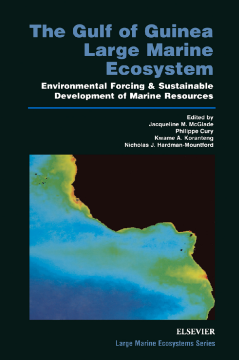
BOOK
The Gulf of Guinea Large Marine Ecosystem
J.M. McGlade | P. Cury | K.A. Koranteng | N.J. Hardman-Mountford
(2002)
Additional Information
Book Details
Abstract
The Gulf of Guinea volume is part of a series on the Large Marine Ecosystems. This volume combines the latest research on the Gulf of Guinea from scientists working primarily in the region and from Europe. It covers the dynamics of the oceanic and coastal waters of the region, the major biological resources, pollution in the marine environment and the socio-economics and governance of marine fisheries. A significant number of new data sets, including some which have been repatriated from outside the region, are now made available through this publication.
The combination of the various chapters underlines the interlinkages that exist between the interannual and seasonal dynamical behaviour of the oceanic offshore waters and the living marine resources along the coast, and the direct effect they have on the livelihoods of the populations living throughout the Gulf of Guinea.
The volume is intended for those who have a general interest in the region as well as those who work professionally in the field. It will also be of immense value to resource managers and policy-makers as a demonstration project on how research can help solve the pressing problems of economic and food security in coastal regions.
...this will be an important and welcome volume both to those who are directly concerned with major marine ecosystems and to those who deal in the modelling of complex ecosystems.
Bulletin of the British Ecological Society
J.G. Field
...The book gives a synthesis of the present state of the art of ecology, oceanography and fisheries sciences, and their interaction in the tropical eastern Atlantic. It will also be useful for fisheries and coastal zone managers in developing countries and those involved in the other 50 or so ongoing or proposed GEF-funded studies of LMEs of the world, through which the coastal component of the Global Ocean Observing System (GOOS) is likely to grow, particularly in developing countries.
Journal of Experimental Marine Biology & Ecology
